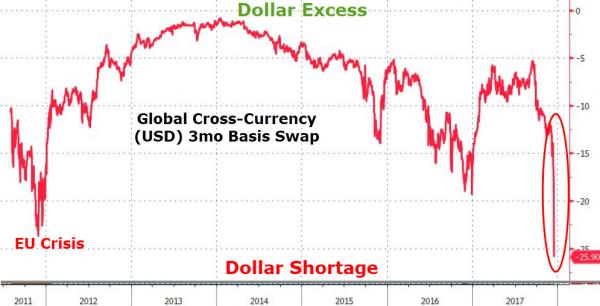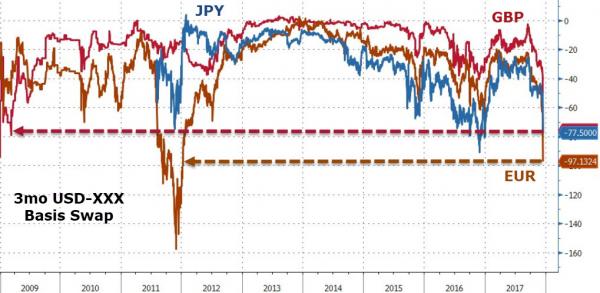Very quietly, in the last few days, cross currency basis swaps (CCBS) related to the dollar have reversed their rise and started collapsing deeper into negative territory… again. This might not be of much interest to buyers of global equity markets at this point, but it is signaling ominous signs of growing funding stress in the financial “plumbing”.

As Bloomberg notes “cross-currency basis swaps, which money managers and corporate treasurers outside the U.S. can use to borrow in dollars, remain close to the widest levels since January even after quarter-end, when such financing strains typically dissipate. The market was a key indicator of stress during the financial crisis, and while it’s nowhere near the alarming levels of that era, it’s still garnering the attention of analysts.”
The shortage is across all the majors…

The shortage in Europe is the worst since the EU Crisis and the shortage in UK is the worst since Lehman as Japanese dollar shortage is extreme too.
In simple terms, the CCBS is the cost in basis points (typically for three months) of swapping these currencies into dollars over and above prevailing interest rate differentials. In a benign environment, the CCBS should trade at zero, not in negative territory. The latter implies a shortage of US dollar balance sheet (credit) offered by the global banking system. As the chart above shows, dollar liquidity became extremely tight in December 2016, especially for Yen borrowers, although it not nearly as bad as what happened in May of 2015 when we first brought attention to this little-followed corner of the financial system. Despite the weakness in the dollar during much of the current year, the dollar liquidity issue never completely disappeared.
There are several reasons why, like in recent years, financing in dollars is becoming more expensive, but this very sudden spike in dollar funding costs – i.e. a sudden dollar shortage – likely combines the effects of the perception of credit risk for the European region’s banks (Italy), the prospect that a U.S. tax overhaul could trigger dollar repatriation, and the outlook for monetary-policy divergence with the Federal Reserve starting to unwind its balance sheet, and analysts see the trend only worsening (even as Draghi promises to taper).














Leave A Comment